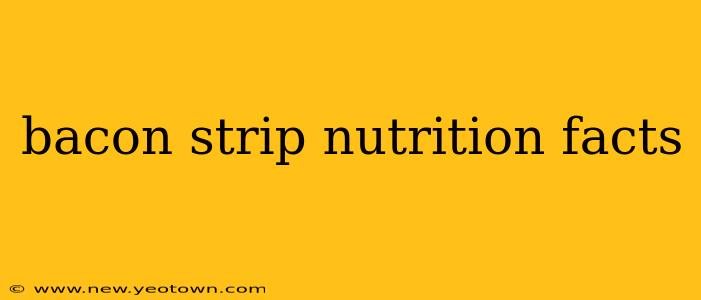Bacon. The smell alone conjures images of sizzling mornings, hearty breakfasts, and maybe even a little bit of guilt. This crispy, salty delight is a breakfast favorite across the globe, but its nutritional profile is often a source of debate. Let's dive into the specifics of bacon strip nutrition facts, addressing common questions and concerns surrounding this beloved food.
What are the nutrition facts of a typical bacon strip?
A single, average-cooked bacon strip (around 14 grams) typically contains around 40-50 calories. However, this can vary significantly depending on the type of bacon (thick-cut, thin-cut, center-cut), the brand, and even the cooking method. Remember those extra crispy strips? They might contain slightly fewer calories due to rendered fat, but they also might have a higher concentration of harmful compounds formed during high-heat cooking. Always check the nutrition label on the specific bacon package you're consuming for the most accurate information.
How much fat, protein, and carbohydrates are in a bacon strip?
The macronutrient breakdown of a bacon strip is predominantly fat and protein, with minimal carbohydrates. A typical strip will contain around 3-4 grams of protein, a significant amount of fat (mostly saturated), and virtually no carbohydrates. It's this high fat content that contributes to bacon's rich flavor and also makes it a somewhat controversial food in terms of its impact on heart health.
Is bacon healthy?
This is the million-dollar question, and the answer is nuanced. Bacon is undeniably delicious, providing a satisfying salty, smoky flavor that many find irresistible. However, its high saturated fat content is a concern for some, as it can potentially raise cholesterol levels and increase the risk of heart disease. Moderation is key. Enjoying bacon occasionally as part of a balanced diet is less likely to cause problems than consuming it daily in large quantities.
What are the health risks of eating bacon?
The primary health risk associated with bacon consumption is its high saturated fat content. Excessive saturated fat intake can contribute to elevated cholesterol levels, increasing the risk of heart disease and stroke. Furthermore, the process of curing and smoking bacon can lead to the formation of harmful compounds like nitrites and nitrosamines, which are linked to an increased cancer risk. Again, consuming bacon in moderation is vital to mitigating these risks.
What are the benefits of eating bacon (if any)?
While the drawbacks of bacon are well-documented, there are some minor benefits to consider. Bacon is a good source of protein, essential for building and repairing tissues, and it contains small amounts of certain vitamins and minerals. However, these benefits are typically overshadowed by the potential negative effects of its high fat and potentially harmful compound content.
How can I reduce the health risks of eating bacon?
If you enjoy bacon, there are ways to minimize the potential health risks:
- Choose leaner bacon: Look for brands that advertise lower fat content.
- Cook bacon carefully: Avoid burning or overcooking, as this can increase the formation of harmful compounds. Baking or air-frying are generally healthier alternatives to frying.
- Eat bacon in moderation: Limit your consumption to occasional treats rather than a daily staple.
- Balance your diet: Ensure your overall diet is rich in fruits, vegetables, and whole grains to offset the negative impacts of bacon's high fat content.
In conclusion, bacon strip nutrition facts reveal a food that's high in protein and fat but low in carbohydrates. While it can be part of a balanced diet in moderation, its high saturated fat content and potential for harmful compounds warrant mindful consumption. Knowing the nutritional details and following the tips above can help you enjoy this breakfast favorite while minimizing its potential negative health effects.

